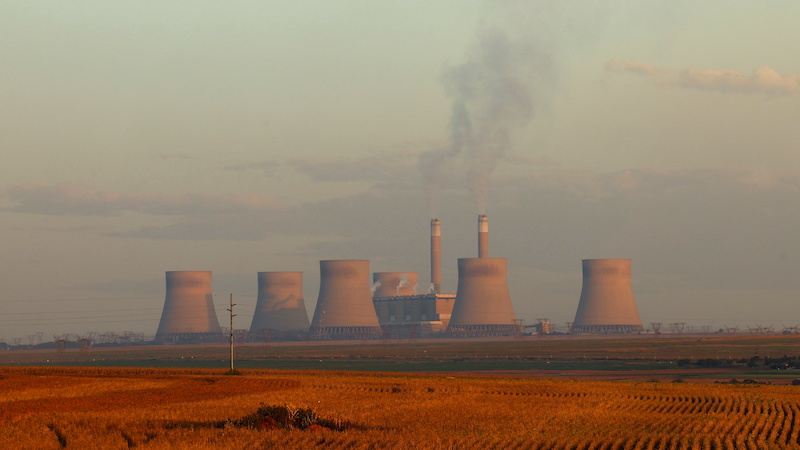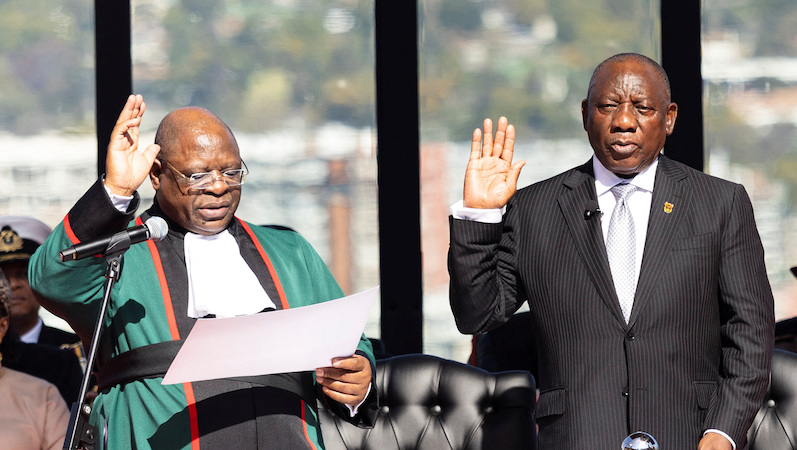South Africa’s energy transition is likely to accelerate after voters forced the ruling African National Congress (ANC) into a power-sharing arrangement for the first time, analysts say.
On Sunday President Cyril Ramaphosa appointed ministers from his ANC party and the pro-business opposition Democratic Alliance (DA) to serve in his “government of national unity”.
In one of the most significant changes, Ramaphosa took away pro-coal minister Gwede Mantashe’s control of the energy sector. Hilton Trollip, a Cape Town University energy researcher, told Climate Home that Mantashe had previously “paralysed” the government’s renewables programme.
The Department of Mineral Resources and Energy has now been split in two. Mantashe is only keeping control of mining and hydrocarbons, while the ANC’s Kgosientsho Ramokgopa, previously the electricity minister, will now be in charge of setting energy policy with a wider mandate.
EU “green” funds invest millions in expanding coal giants in China, India
Trollip said it was unclear if Ramokgopa would boost renewables as he has not held much power until now. But there is now a better chance that Mantashe’s highly contentious Integrated Resource Plan – which envisages a slowdown in renewable energy investments and a switch to gas-fired power – will be revised, he added.
DA’s Dion George is the new environment minister replacing Barbara Creecy, who has been moved to transport.
Creecy played an active role in several COP climate talks, most importantly successfully proposing a global goal on adaptation at COP26 in 2021.
JETP talks
Owing to its heavy reliance on coal for electricity, the country is Africa’s biggest emitter of greenhouse gases.
That made it a prime candidate for a world-first funding agreement, backed by wealthy nations, aimed at ramping up investments in clean energy while also protecting those reliant on the fossil fuel sector.
But two and a half years after it was announced, the now $9.3 billion “Just Energy Transition Partnership” (JETP) has made little tangible progress on the ground.
Meanwhile, as the country grapples with rolling blackouts, state-owned utility Eskom has announced plans to delay the decommissioning of at least three of its coal-fired power plants by several years – raising the risk that funding partners will walk back on their offers.

A general view of Kendal Power Station, a coal-fired station of South African utility Eskom, in the Mpumalanga province. REUTERS/Siphiwe Sibeko
Kevin Mileham, the DA’s shadow minister of mineral resources and energy, told Climate Home that South Africa’s JETP “will need to be accelerated” as the country is currently not on track to meet global climate goals.
The party wants to see “a rapid roll out” of the programme which will require improved dialogue with the wealthy European and North American countries funding part of it, he added.
It also wants to advance the implementation of a climate change adaptation strategy and believes South Africa needs to do a better job at tracking and reporting its efforts to reduce carbon emissions, Mileham said.
Much of the progress will hinge on the government’s ability to form a united front on foreign policy and forge an effective relationship with the international funding partners.
The ANC and DA have regularly clashed on international affairs, such as the country’s support to Palestine.
They will need to “reconcile their differences [on foreign policy] and come to a shared understanding on international multilateral processes,” says Happy Khambule, energy and environment policy director at Business Unity South Africa, a business lobby group.
Tensions over private sector role
He added that private companies, which will have a significant role in the transition, want to see policy certainty enhanced in the months ahead.
The group is awaiting the finalisation of the Electricity Regulation Amendment Bill, which promises to open up the electricity market and put an end to Eskom’s longstanding monopoly, and the Integrated Resource Plan.
Comment: Africa cannot afford to be complacent about solar radiation management
Meanwhile, the DA’s preference for greater private sector involvement in the energy transition could create fresh tensions with key stakeholders. Left-wing adversaries often deridingly label the DA a “neoliberal” party.
The country’s largest trade union group COSATU wants the newly separated energy department to “stop the privatisation of electricity and energy”, and instead promote state and social ownership models.
“We don’t expect major shifts with regards to the just transition, but rather a more focused approach on its implementation, in particular to make sure workers and communities and value chains are not left behind,” a spokesperson for the organisation told Climate Home.
The just transition should be overseen by multiple government departments given “the triple crisis” of unemployment, climate change and energy shortages, they added, suggesting that, for example, the finance ministry should raise spending on climate-focused public employment schemes.
(Reporting by Nick Hedley, editing by Joe Lo and Matteo Civillini)
